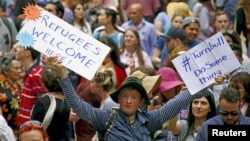Australia has begun the task of selecting for resettlement 12,000 refugees from the crisis in Syria, with the first group expected to arrive before late December.
Sydney’s Lakemba district is one of Australia’s most multicultural areas. It has become a haven for a family from the Syrian city Homs, which fled to Lebanon before arriving as refugees in Australia at the start of the year.
Youssef al-Kasseh lives with his wife, Hala, and their three children, along with his mother in a small rented house.
Speaking through a translator, he said the horrors of what they left behind are always in their thoughts.
“Life in Homs is very, very bad and no matter how hard I try to explain, it is very hard," said Youssef. "There is killing all the time, people getting taken away, while they have been taken away, they have been killed.”
Detention, torture, death
Youssef said he was detained and tortured by government officials.
“I was taken away and suffered a lot, hit a lot, and suffered not only physically, but also the mental trauma. I have a lot of family and friends that have died,” he said.
His wife Hala is happy to be in Australia, but she also worries about those left behind.
“I have a lot of friends and family in Syria, and I am very, very afraid of how they are living. They have no food, no electricity. Life is very, very hard and I am constantly worried,” she said.
Rallies urging Australia to take in more of those fleeing the conflict in Syria have been held across the country.
New South Wales
More than half of the 12,000 refugees will be resettled in New South Wales, the nation’s most populous state. Displaced women, children and families living in camps in Jordan, Lebanon and Turkey will be given priority.
Coordinating plans for their arrival is Professor Peter Shergold, an academic and businessman.
“It's possible that, compared to many refugee groups accepted in the past, these newcomers may have spent less time in refugee camps," said Shergold.
"They may be more likely, I think, to be educated, have trade and professional skills, have had experience in small business, be more likely to have at least rudimentary English," he said. "And of course, therefore, the challenge. And the vital challenge is how can we harness that education, those skills, so that they can contribute back to Australian society.”
Youssef and his family listen to a song that laments Syria’s descent into chaos and the killing of the innocent.
They hope that more of their countrymen and women will follow them to safety in Australia, which will give preference to refugees from persecuted minorities.
Samar Almajzoub, a Syrian community activist, believes Australia should do more and open its doors to members of the Sunni majority.
“We need more refugees here. I think this is [a] small number," said Almajzoub. "The people [who] are suffering there — very, very big number. The minority people, they [are] not suffering as much as the Sunni people and the larger group of people there.”
Australian resettlement officials are now in Jordan to begin assessing Syrian refugees who have been living in camps.




